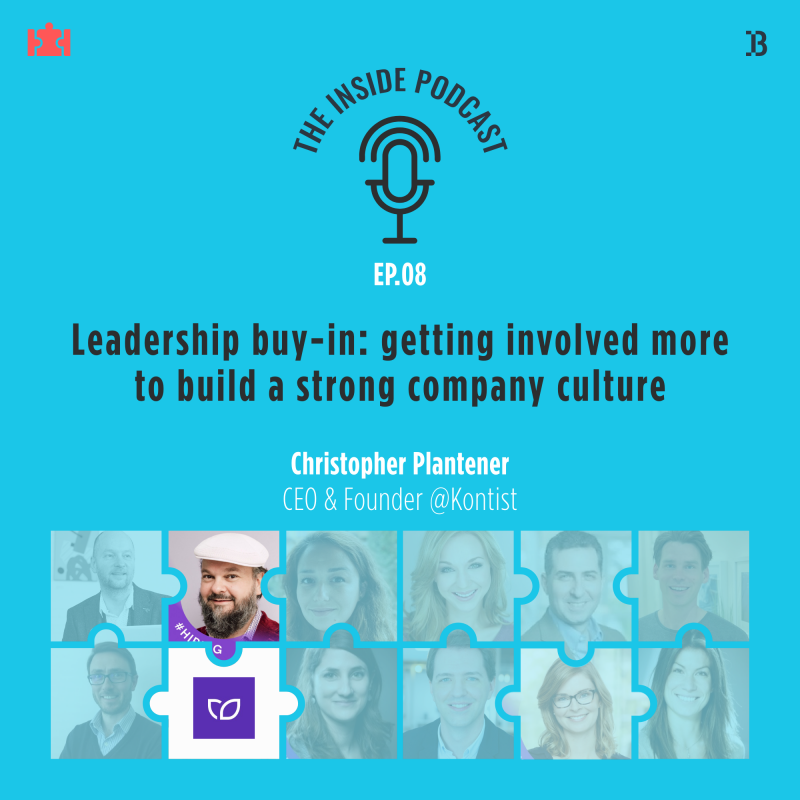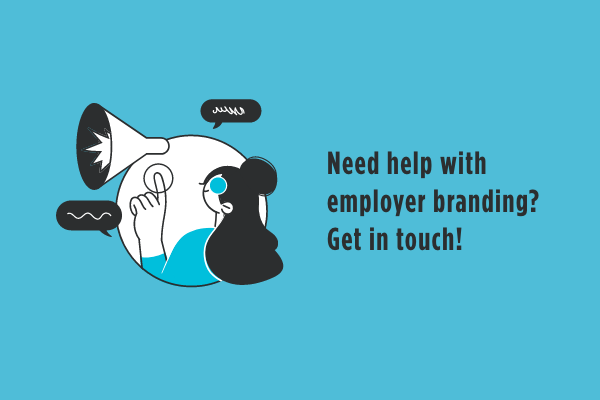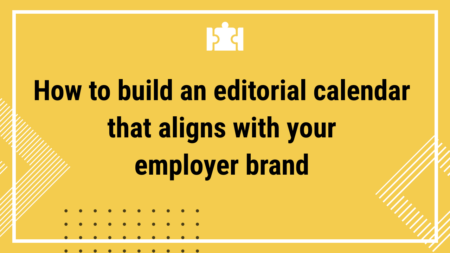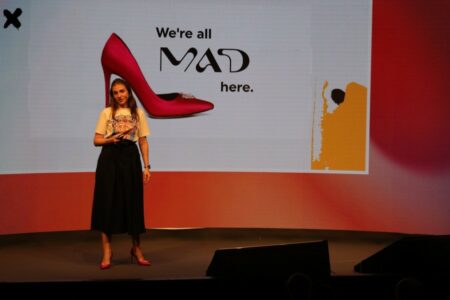Overview
It’s #ThursdayPodcast once again! In episode 8 of Employer Branding: The Inside Podcast we had the pleasure of speaking with Christopher Plantener, CEO & Founder at Kontist. We talked more in-depth about leadership involvement in building a strong company culture, but also about the importance of internal communication, diversity, trends, and a lot more. Tune in on Spotify to learn more!
What you’ll learn by listening
- Flexibility & equality when working with freelancers & employees
- Maintaining company culture cohesion: keeping freelancers & employees united
- Internal communication: the key to maintaining a strong company culture
- Employer branding & data: measuring employee happiness levels
- Employer branding trends: rethinking the traditional office, aligning purpose & values
About the company
We believe freelancers will shape the future of work, challenging corporate structures, embracing individuality and building successful businesses. Today freelancers don’t get the help they need, in particular when it comes to the complexity of their finances. Kontist provides the banking services freelancers deserve, making finances easy.
Podcast link – Enjoy listening to S03Ep.08!
Podcast transcription
Georgiana: Hi everyone! I’m Georgiana. And today, on Employer Branding: The Inside Podcast, I’m talking to a founder this time not to an employer branding manager. His name is Christopher Plantener, the CEO and founder at Kontist. Welcome, Christopher! Thank you so much for talking to me today.
Christopher Plantener: Very, very nice to be here! Such a pleasure!
Georgiana: I think it was very interesting for our audience to hear about company culture and employer branding from founders as well. So you know, you might be actually launching a trend in this podcast. Please tell us, Christopher, what do you do? And what does Kontist do exactly?
Christopher Plantener: So I’m the founder of Kontist and the company started as a bank, a bank account for self-employed. So we’re really focusing on freelancers, our target group. Now we basically enlarged our service and now we offer a bank account, fully automated accounting and tax declaration – all in one app for freelancers, here in Germany.
Georgiana: I know, taxes are quite a hassle when when you move to Germany. I’ve experienced it myself. So your product must be really in use at the moment.
Christopher Plantener: Yeah, it’s quite crazy. I mean, we started a couple of years ago, we just talked about it, we even shared like an office at the time. I think it was in 2016. But then we started with the bank account. And for many years, people have freelancers in Germany has kind of understood that Kontist offers banking for freelancers. Now with the extension into the taxes, these are very interesting areas. It took us a year to make it publicly available that we are also doing that service now.
Now, where we’re having so much growth in this area. I’m much more into this topic of employer branding right now, meaning that we plan to hire so many people because it’s a pretty steep growth that we are facing at the time being. And of course, as you can imagine, doing tax declarations for people, which ultimately is going to be very much automated. But in the early phases it still requires also a lot of human help. And that’s why we also need technicians, of course, to be able to build all the fancy AI-driven systems which are building to make that happen.
Georgiana: I’m curious, I mean, your services are definitely destined to freelancers, right? However, you are also working with freelancers in the company or not? Are you combining both typical employees and freelancers? Or how is the business model organized?
Christopher Plantener: The funny thing is like when we met the first time we had a rule. Until 2018, if you had never been a freelancer, you could only start as a freelancer working for us. Basically I’ve been saying, if you have not had the German fear on your forehead when receiving a letter from the tax authorities, you have not been self employed or freelancer, right? And I wanted to make sure that everybody had this experience, do their own accounting, get a tax number, all these kinds of things. And that actually was really good.
It was the best cultural fit training program I could have possibly invented. It made sure that okay, the German law does not allow that everybody is freelancing all the time, right? So after a certain time, you have migrate to regular employment and it was also not the typical built-in with cheap gig economy, workers and then laying them off again. That was not the idea. The idea was to understand our customers. Now we are too big, we’re not allowed to do this anymore. But we still have a lot of freelancers and particularly since Corona and during Corona we doubled in size of employees; and all that in a complete a remote world. That’s also when we started our tech service, without ever meeting each other and it was quite quite a challenge. Now, of course, we are remote first but we are also like hiring people all over the world. We’re trying to take the benefits of of that, and if somebody is outside of Germany, typically it also gonna start as a freelancer. But what is quite important in our end is that, because we have a product only for freelancers and we value them very much, nobody in the company makes a difference.
So for most people, I’m not even sure if they know if who’s an employee and who’s a freelancer, right? In my world, everyone has the same rights, the same obligations. And I don’t want people to run around in the company and say, ‘Oh, but he or she is a freelancer, and he or she is not’. This is a team member. And maybe a team member works only certain times, but an employee can also only work at certain times, and so forth. Now, we are much more flexible anyway. So like, the fixed amount of hours becomes less of the main topic. So I see a big trend, which we had already, before Corona, is now continuing. It’s a convergence between the freelance and the employer world?
Georgiana: And how do you manage to keep the culture cohesive, given these circumstances? So one thing you mentioned was that you don’t really make a difference between who’s a full time employee and a freelancer, right? What other methods do you guys use? For keeping everyone under the same roof?
Christopher Plantener: I mean, there are struggles and we’re still experimenting like everybody else in the in the corona crisis. If you ask my my teammates and for my employees, I would say that we have a relatively strong culture Kontist. That’s something I’ve always been very proud of. And when I started the company, and that’s still kind of an OKR many years and hangs on our wall is really, we wanted to create the best startup in Berlin to work for. This is kind of a big goal. And I’m not at all saying that we are there yet, and I’m sure you can never kind of relax. And sometimes you’re better. And sometimes you’re worse.
Before Corona we had a culture driven around being in the office, meetings, having events, and doing things together. And we didn’t differentiate between freelancers a lot. So, you could come to the office, you could not; you could be a freelance or not, that was not at all the line which divided us. Now that we are basically in a in a Corona first world we have changed. Our for the entire company, both for employees and for freelancers. We have become a remote first company, officially. So nobody is in any way or shape obliged, since 1.5 years now, to actually come to the office anymore. It’s still kind of an ongoing experiment, which we have just prolonged for another year. Because I do also see that as a critical aspect, particularly as the founder of the company, which has this very strong belief into culture. I guess, I’m not saying, oh, you know, let’s just do that.
I guess I have this feeling sometimes that in these days there’s a tendency that also goes for myself, but for a lot of people, that we have a tendency of kind of thinking of ourselves first, and a bit forgetting that the company has also a social aspect to it. I mean, sometimes you come in to go to a meeting, not because this meeting is so useful for you, but actually, your colleagues, for them, it’s very important to get information from you. Onboarding, right? We had, I think, almost 100 people, which we had to onboard this year during Corona.
It’s easier for them to get into the job and know what to do if they can just turn around and talk to a colleague. In a sense, I’ve heard we had a very strong wish inside the company that we should go this reverse remote first. And I do think my obligation, as a founder, is to create an environment in which we can experiment and create successful experiments. And if this is a great wish, from everybody in the team, I said, ‘Okay, I see that critical and I want to go with you guys’. And let’s figure out how this is best done. And that’s basically the focus now, ene though we have other things to rethink. One example is we had like a big open space and then we basically did need that anymore? Right? So we turned this now into a into an event space, right? And that is an event space, where, where freelancers can meet. Now in Corona, it’s not too many external events and stuff like this.
But we actually deliberately also say, for people, you know, why don’t you come after work? Right? I’m always saying to the people, you if you think you can work better at home, then do that. That’s completely fine. But maybe, for a four or five o’clock meeting, why don’t you do that in the office? And afterwards, stay for an hour or two, and basically socialize and meet people. I don’t really care when you do it. But I do think that it is important that you actually have contact. And that’s exactly one of the initiatives. Now, again, we are completely closed due to the Corona situation, but during the summer, it was actually used quite a lot by my colleagues. So we suddenly see the change – from people who were not during the day in the office, but then in the late afternoon, early evening, you could see them socialize, and people actually come into the office. Also, there’s downsides to it, right?
I mean, that works very well for the younger crowds out there, which may be single and like to meet and, and that’s very cool. We are growing and I’m also the father of four kids, meaning that I cannot hang out every evening in the office, I love it. That’s a very nice way of interacting with people and stuff like this. But this cannot be the only way, right? We have to remember that as different social groups in a company. And we also have to give people which cannot come every evening and party at the company, a room to meet. But that’s exactly some of these challenges, which you know, I’ve been doing. And then there’s another thing that’s really in terms of communication, I haven’t really started with that. But I’m kind of wanting to do this; to focus much more on internal communication, in a sense to have like an internal podcast; we are setting up a studio internally as well, where we’re going to be doing videos. And to say, we have to change the way we communicate inside the company.
If you have the same thing, but I’m sitting so often in front of a screen with 50 tiles on it, because I would like to see at least a glimpse of the people from time to time. But this is really not inspiring, right? It’s really, really not. So I do think we have to triple down on internal communication and define, like, setting new measures, rethinking the way we do this, not necessarily only one way communication. I would like to invite other people’s teams to have a dialogue, but to have find different ways and qualities of dialogue in this remote world.
Georgiana: And and I’m wondering, you know, because I’m trying to make this vast field of employer branding a bit more measurable. So I was wondering, what role does data play into your company culture at Kontist? And how do you actually keep track of people’s happiness?
Christopher Plantener: We had from almost day one a tool called Office Vibe, where we had lined up. It’s rolling weekly, bi weekly surveys. The problem was a bit with the participation. Before Corona it was not always the very best, I have to admit. On our side, sometimes I think, taking surveys is one thing, but then teams are also expecting that action will happen, right? We have changed to another tool called Culture Amp. And we have decided to change the way and kind of have like one big annual survey which we just had. It’s very comprehensive, going you know about everything, general happiness, recommending the company culture, values, all these kinds of things. And now we just got that. Actually, I think tomorrow I will be informing the company about it and also about kind of what concrete actions and measurements we will take now. And then hopefully in one year when we measure again, we will see improvements.
Georgiana: And if you were to make some key predictions, let’s say for next year when it comes to talent acquisition or employer branding, what would you say is going to happen? What major companies should really pay attention to?
Christopher Plantener: I mean, I think it’s a bit of what I’ve already said. I think the remote-first or this entire topic of remote, is going to be the main topic. I can already see right now some people will only basically hire with companies or go with companies which basically are completely flexible. Others will also tolerate if you have other policies, but I think companies have to be pretty clear about that. And my guess would be the more flexible you are, the better; the more attractive it will make you.
But of course, it has addressed the downsides, which we already discussed a bit earlier. So I think, around that, as I said, rethink the office. I’ve heard this in a couple of other interesting podcasts and articles, that it’s not really the office rethink the way we need it to be. I mean I’ve heard from other people, and CEOs and founders, they had these bonfire meetings, and I mean, so many other places and possibilities and stuff. But rethinking that, and making that part of the company culture and offering that is gonna be an important thing. And I do think that when you talk employer branding and recruiting, the people will buy into concepts. And some people will basically say, I like that new way, it’s maybe not 100% flexible, but actually, I like the vision behind that.
This is exactly what is attracting me and then other companies will offer other things where, again, new people will come through. But it’s important to have a very clear offering. And to also communicate clearly; that’s what we are doing to make it kind of more attractive. And there’s many possibilities. I talked to others who are also thinking about that – should we maybe offer remote office on an island in Spain, in Croatia or something like that? To make it more attractive, so that people can spend the winter time there instead of Berlin. Considerations, which I hear in the market, at least I’m sure you do, too. A lot of companies are thinking about them. Then another trend is this entire topic of purpose and value, which was there before Corona.
The value topic has been a long time on my list. Due to Corona, I had a couple of emergency topics I needed to kind of fix first. I really hope that next year, I will have the time to dribble down on that. On purpose, we had set up this Kontist Foundation, where we are also doing a lot and we have helped a lot of self-employed also during Corona. And that is a good example to engage and we have always done that. But I do think that a lot of that is going to become a much bigger trend in employer branding. I mean, in an ideal case, of course, you’re doing it, we’re doing it for our customers. So it strategically stays coherent. And you know, I’m always doing this for the key positions in the company. I do like the last interview, the so-called culture checks.
And then I always say to people, you know, if you are not really kind of waking up in the morning and saying, you know, I really want to make a difference for freelancers, there is no fit for you at Kontist, right? So it’s getting closer around, like the purpose of a company. Also, I think, filtering better. I also recommend to employees out there to find the company where their heart really beats strong and maybe stay a bit longer. That is another trend out there, which I see. I don’t know, it’s Berlin here. I’m sure other bigger cities have this as well. The rotation is quite steep, which I find a bit sad in the sense because it’s actually a counter movement to the purpose, right? I mean, on the one hand you have a belief in a certain purpose, but are you only going to work two years for that purpose. You don’t see it like that?
Georgiana: I think it also has to do a lot with the way people are being recruited. You know, I think there’s a big disconnect between what employers are looking for and what people are seeing at some companies. And then you don’t get into the companies, people that really resonate with the purpose and people that really want to stay with you for the long run. So that’s also something that me personally, as a consultant when I work a lot whenever I talk to CEOs and employer branding managers. But anyway, just to sum up, it really is nice for me to see that this remote office trend is becoming a constant with everybody that I talked to.
This is really something that I think we’ll be seeing more and more next year. And I really liked the idea of including corporate social responsibility, and in a way sustainability in your employer branding strategy because it’s also going to help you retain and attract better people, I think, right? I really like this about Kontist, not many companies do it. And then I guess also, leadership buy in, is also something that’s going to happen more and more. And I think leadership involvement in the end is going to be more and more important in the years to come when it comes to employer branding. This didn’t happen before, so it’s something completely new.
Christopher Plantener: It’s a good point. Yeah. I mean, it’s definitely an area where we where we need to improve. I’m thinking, while you were saying that. But there’s also, in a in a startup, there’s of course, various phases, right? You have the founder’s phase where you have the founding team member. You get new people in, so there’s also a certain challenge, actually, in various phases of a company getting new people and making those people buy into certain aspects, right? So I found that to be quite a challenging thing. Whereas my personal role, I think, in all that has always stayed the same. But it’s easy as a founder, right? You start the company, of course, but your values, your engagement stays very similar. The role of the teams around you actually changes over time as the company is growing. But it’s a very good point, I will be thinking about that.
Georgiana: And what’s in line for Kontist in 2022? What are your plans?
Christopher Plantener: Oh, yeah, we have a lot of crazy plans. Some I cannot yet disclose, but hopefully, will be shared in Q1. On the on the employer branding hiring side, I guess we are going to be more than doubling again. So that’s I think, 70 people are planned to be hired next year. You are in this market, so you know that is not easy. We also have a particular challenge that we have such a diverse team: on the one hand side is tax expert, and we are looking for a lot of tech experts, product experts, and also in our banking field in customer support and the like. So it’s not only like one group, but a lot of different ones.
At the same time, I think for us, it’s actually quite true to really change an industry. I mean, this taxation industry in Germany is one of the most old fashioned industries out there. And coming in there with a completely new spirit is very good. A lot of employees are coming to us and I had the most crazy scenes last year when people were speaking up, telling everybody how different it is to work in a startup in Berlin in this industry, versus a tax advisory where they worked the last 12 years. So you really have this experience of people kind of waking up for the first time, which is rare, right? I worked all my life in the tech environment. Typically we have all been working in this environment. It’s the same kind of people and it’s agile.
Georgiana: You’re right, it’s about the same environment. Exactly.
Christopher Plantener: But if you actually take a completely new industry, and bringing it the next level, you can really see in people’s eyes. You can see that what we consider in our little bubble normal, for a big part out there is completely not. And that is a great opportunities. And I’m so often thinking, I’m not sure who is listening to us right now, but I also think guys out there, outside of the Berlin bubble.
They have so big opportunities, you know, if they just take some of these techniques and opportunities and bring them into more traditional environments. You can really inspire people, you can really make a difference. And you don’t have to reinvent the wheel, you can just look at what works and implement. You just have to go for your industry, for where you are today. But not into the complete blue where you have no clue what you’re getting into. So this opportunity, I see for us a lot in the in the in the tech space. Still, we need to make sure that people hear about us and actually see this. But then that was one of the really cool things in 2021, for me to see what impact you can have, actually.
Yeah, and sort of expanding your employer reach beyond your bubble. Yes. I’m also a strong advocate of hiring people who could do the job, not necessarily the ones that you know, for sure can do it. But that’s a huge change of mind frame in Berlin, as far as I can see it.
Yeah, true. I think everywhere. But I mean, we are all faced 2022. Okay, still a bit of a post Corona year, but in our high education, high tech bubble. We are so much looking for people, right? And there is just not enough. So if we’re not being creative, if we’re not thinking, we will not be able to get to reach that, right? So we have to think different and have to consider different people to do that. We are quite diverse, I would argue that in some areas we have 46 different nationalities, the last time somebody threw me a number. So we have a lot when it comes to that. Age wise, Berlin tends to be a bit younger. But where I do think, for example at Kontist, there’s still a lot of room. We have also more women than the man actually, and that’s pretty rare.
I think it was last time was 60% women or something. Not yet in leadership, that’s something we have to try particularly on the executive board to get one or two women on that level. In some areas, for example, in Berlin we’re often neglecting. Families to give an example, I mean, we have a tendency of going for this international, more singles, younger people. There are a couple of companies I talked to in recent time, where they had been really focusing on families, maybe they have done it to the extreme and the other side, that diversity has more aspects than just nationality and gender. We have to think even further in this, or sexual orientation for that matter, which has been high here in Berlin. But there’s other components, which I think we have to foster stronger.
Georgiana: I totally agree. And I have to mention that. I know other women my age. I’m 36 by the way, and I also have a child, women who find it hard to find a flexible job; a job which can allow them to do their pick up from kindergarten everyday, drop offs and so on. So, indeed, this is a another diversity aspect that’s sort of not being taken into account.
Christopher Plantener: What I truly believe is that there are these tandem drops. I know this has been up here in Berlin. I have shared now since three years. At first, it was a woman, now we’re two men and the CEO role, right? What I’m trying to say, he wants also to go on into paternity leave. I really believe that in drop sharing on key positions, and in my ideal world we would have duplicates on almost all key positions. With that purpose in mind, right? It doesn’t have to be only two women, it can also be a man.
I know a lot of men, which also want to spend more time with their families. So I really believe that mentality could very much change the way. Particularly what I see is a father of four, having lived for 10 years in Denmark. I really think there is great opportunity to do more. And I do hope, at least at Kontist we will be become more systematic. Right now I’m preaching it, but we don’t have a regular program yet. I hope that we actually will start going. But I think that the best thing is, as a CEO, you have to do it right. Show to others that if I can do it, you can do it. And nobody else in the company should be afraid to ask and say, I would like to do that model for somebody else. Right?
Georgiana: Yeah, absolutely. You know, Christopher, we’re now reaching the end of our episode, and I need to ask you the question that I asked all of my guests. And that is to tell us what’s the one thing that’s helped you a lot in your career? Like, I don’t know, it can be books, it can be blog posts, movies, whatever, something that’s been really instrumental for you.
Christopher Plantener: It’s a book called “Delivering Happiness”. I’m sure a lot of people have heard about it. I’ve read it again. It has been a really great inspiration. The company culture is just something admirable. Whenever I read the book, I’m just like, Oh my God, I want that as well. The values, the value-driven organization has really inspired me. And it is giving me a lot of energy and guidance for the next phase of my company. So that’s definitely one of the resources I would recommend.
Georgiana: That is much appreciated. I have to say, he was way ahead of his time.And it’s definitely book is definitely on my reading list as well. And that being said, I want to thank you Christopher for the nice talk. It was really good having you today and finding out so much more about Kontist. I wish you the best of luck in 2022
Christopher Plantener: Thank you so much for having me.
This was Employer Branding: The Inside Podcast. You can find our podcasts on Spotify on Apple podcasts and content on employer branding-related things on employerbranding.tech. Until the next time, stay tuned.







